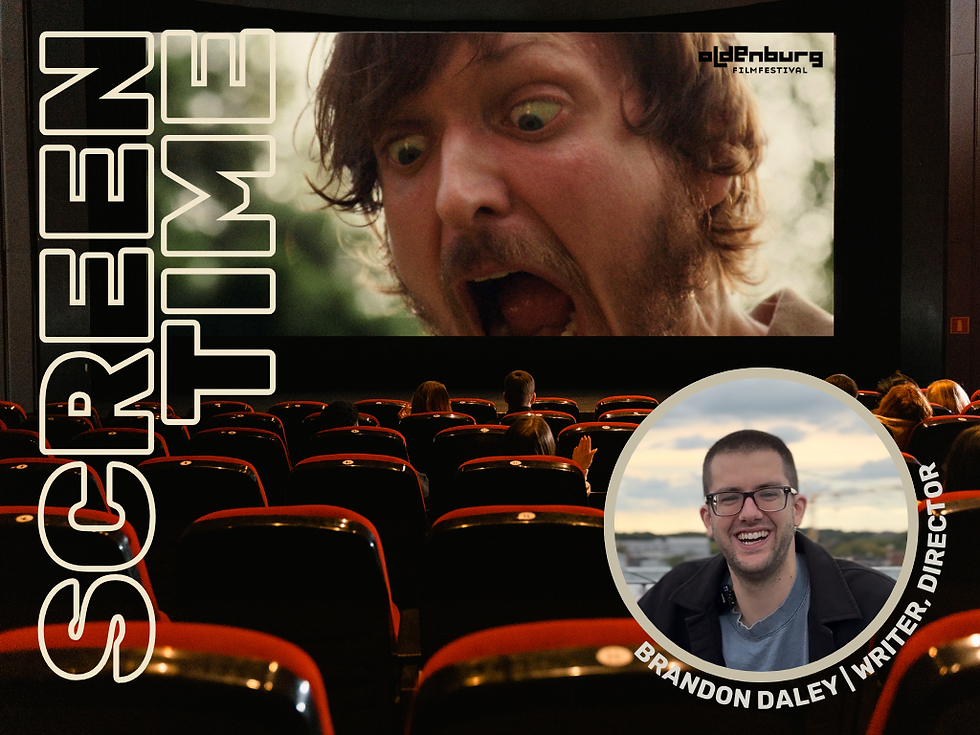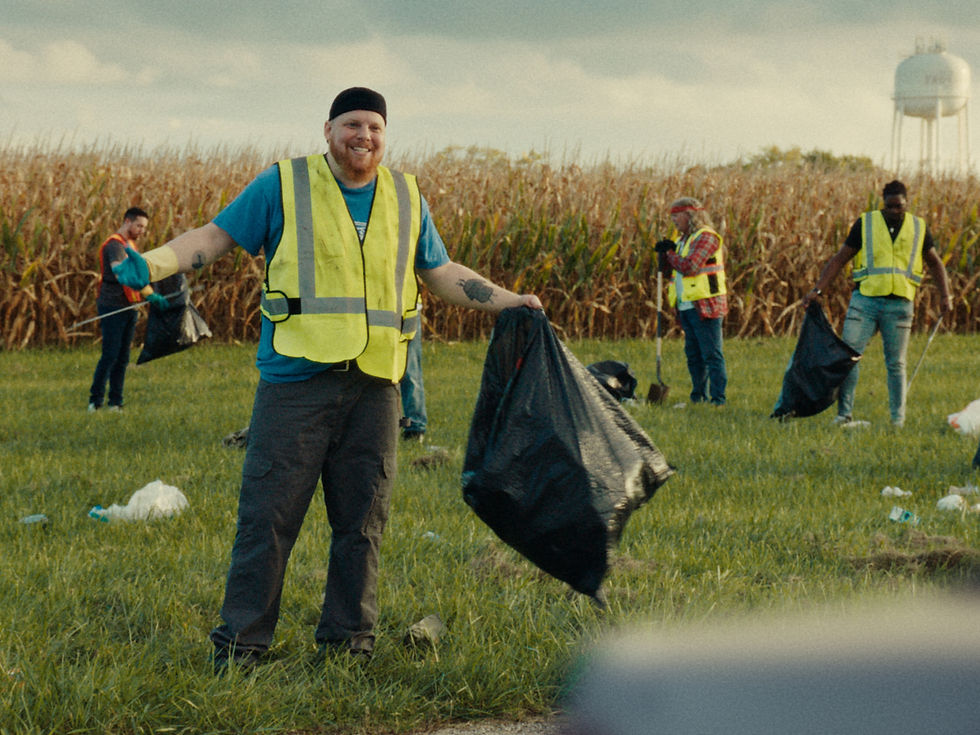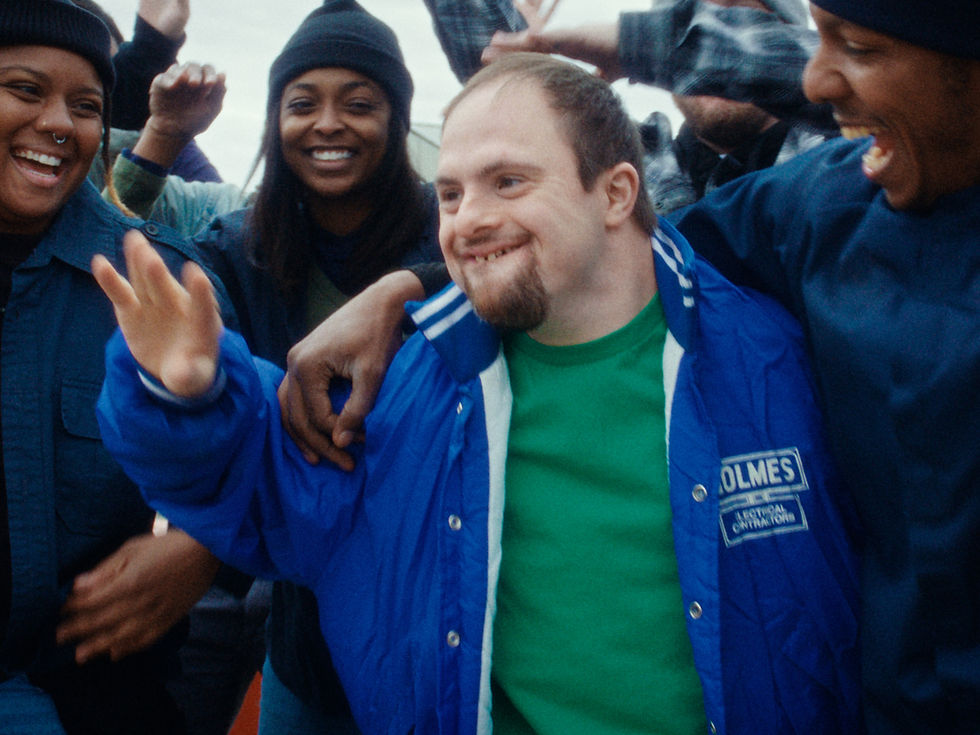SCREEN TIME #1: BRANDON DALEY
- 11. Sept. 2025
- 10 Min. Lesezeit
Aktualisiert: 14. Sept. 2025
Das 32. Internationale Filmfest Oldenburg hat begonnen - und der Kulturschnack ist mitten drin! Für unser Format SCREEN TIME treffen jeden Tag eine Person aus dem Festivalbetrieb: Regisseur:innen, Schauspieler:innen oder jemand ganz anderen. Mit ihnen sprechen wir über die Filme, das Kino, die Unabhängigkeit und was uns sonst noch einfällt. Das Ergebnis? Findet ihr als Video auf unserem Insta-Kanal - und als Interview hier!

Wir haben Glück. Brandon Daley hat eine weite Anreise, er kommt direkt aus Los Angeles nach Oldenburg., Sechzehn Stunden hat er dafür gebraucht. Doch sein Flieger landet bereits am Vormittag des Eröffnungstages des 32. Oldenburger Filmfestes in Bremen -und Brandon ist niemand, der nach so einem Trip einen ausgiebigen Schönheitsschlaf braucht. „Ich bleibe einfach wach“, verrät er. „Irgendwann nach der Party heute Abend geht's ins Bett, dann passt es wieder.“ Und tatsächlich wirkt Brandon keineswegs erschöpft und erweist sich als aufgeweckter Gesprächspartner.
Im Gepäck hat er seinen Debütfilm „$Positions", bei dem er Script und Regie (und noch einiges mehr) übernommen hat. Mit der Tragikomödie rund um Krypto-Spekulationen war er bereits auf fünfzehn Festivals zu Gast. Oldenburg ist jedoch seine erste Station außerhalb Nordamerikas, also der erste Schritt auf den Europäischen Markt. Aber nicht nur deshalb ist Brandon aufgeregt: Er hat auch schon viel Gutes über das Oldenburg Film Festival gehört. In unserem Gespräch erzählt Brandon, warum er am liebsten unabhängig arbeitet, welcher Teil der Produktion ihm am besten gefällt und wie viel von ihm selbst in seinem Film steckt.
$POSITIONS
BY BRANDON DALEY
DO 21.30 UHR
CINE K MUVI TICKETS
FR 16.30 UHR
CINE K STUDIO
Brandon, let's put something out of the way first. How do I say the name of the movie correctly? What does the Dollar Sign mean?
In cryptocurrency and in stocks, a dollar sign will denote the name of a ticker. So if it's „$“, it's a reference to a crypto ticker. I put the dollar sign in there as a nudge to the crypto and stock audiences, that the movie had something to do with that. There is another logic as well: It puts you right at the top of every sort of alphabetical list. But yeah, people do call it „Dollar Sign Positions“ or „Money Sign Positions“, which I did not really expect until the release of the movie. I just called it „Positions“.
The movie has a somewhat humorous note, but at the same time it's really dark and it deals with addiction, death and desperation. How did you come up with that combination?
Definitely.I love comedy. I grew up watching comedy. I don't think people are making enough comedies right now, especially in the United States. So I miss comedies and I only want to make comedies. That’s what I set out to do. But I also want to talk about these heavier things and the way that they affect me. I was interested in making a movie about crypto and stock investing after I'd gotten really into it back in 2020 and 2021. Iwas making and losing a bunch of money like overnight, you know, and it was just so thrilling. And I was so obsessed with it and that's why I wanted to make this into my next movie.
I had been born and raised in Salina, Kansas, and I also wanted to make a movie about my childhood and about my family and about growing up there. And then I just started to think about how, you crypto overlaid on Middle America is such an interesting story because there are so many old manufacturing towns that aren't manufacturing stuff anymore. And crypto represents this kind of lottery ticket or a way to kind of get out of these kinds of holes that we dig ourselves in as just as people. And so, yeah, I pretty much wanted to make a movie about Kansas, and I want to make a movie about crypto. And so I married the two of them, but I wanted it to be as personal as possible. I feel like comedy is not funny unless it's like really vulnerable and personal. Otherwise it just kind of like a sketch comedy or something,

And how much of you is the main character, Mike Alvarado?
I think I'm like all of the characters and there's a amalgamation of things, you know? But for sure, I am my main character in a lot of ways. The main impetus for the idea was a dinner with my girlfriend where I was looking at my phone all the time just seeing my money go up and down. I wasn't present, you know? And I just felt so bad about that. And it was just like such a long period in my life where I was like that to everybody who I love and I'm close with. And this is a very interesting basis of a character because it can be so unlikable for doing that. But we also sympathize because we're all so much on our phones and not really listening to the people around us. We want get these endorphin releases through a digital channel versus friends and family like we used to, you know?
The audience gets very close to the character of Mike. We see him fail and fail and fail for a whole lot of time. And sometimes it's really a bit hard to observe. Is that intentional?
There's lots of great comedies that I love, where you don't get that close to the characters or their problems or anything. And so it is intentional in the sense that any sort of good film is working when you're close with the characters and you're kind of in their shoes and you're not just like an onlooker. You're sympathizing.
Is there some sort of higher moral or some goal you want to achieve with the film?
A lot of people watch the movie and they're like „Oh, nice, Brandon, you took down cryptocurrency.“ And that's not really what I'm trying to say. I view it more as a chaotic neutral, like it's an agent of chaos in your life if you want to partake in it. But it's also very fun and you also can make or lose a lot of money in it. I think this deep in the game, I have less sympathy for people who lose a bunch of money on crypto because it's so late. I think that was a different story in 2017 to 2021, when people were being promised certain things by all these random companys and getting their money stolen, you know? But now it's been around so long, it's hard for me to feel too bad for people that it still happens to because I think you know what you're getting yourselves into. But ultimately, I view myself as very neutral on crypto. At the end of the day, I don't think the movie is pro or anti crypto.
Jet Lag? Keine Spur! Brandon Daley erzählt spannend von seinem Leben als Independent Regisseur. (Bilder: Kulturschnack)
But is there some kind of message that you want to get to the audience?
The real core of the movie is the fact that being alive is extremely hard, no matter who you are. A lot of movies kind of preach hopefulness, but I wanted to make a movie about finding hope despite there being none. It's like a movie about faith, ultimately. And I view the movie as very optimistic at the end of the day. I think a lot of people would disagree with me on that, but I personally think this is a very hopeful movie. And I just want people to feel like comforted, even if their life circumstances are not the greatest or they don't know how to get themselves out. There's always hope, you know.
What do you think or what do you like best about your movie? What do you think is really well?
I've played so many festivals at this point and I love just being in the audience. The one thing I like about comedies is, if it's working with the audience in real time. It feels almost like a piece of music where you're conducting the audience. And you're like: „Oh, are they going to laugh here?“ Certain always get a laugh. And then there are lines where I'm like „I don't know if this is going to hit with this group“. And I love just sitting in a packed audience and feeling the energy, you know? I've had some lbad screenings where people didn't know what they were getting themselves into and there were lots of walkouts. But then you also have audiences that are prepped on how crazy this movie is, and they're in there to have a wild time. And those are just so much fun.
So you always try to sneak into the audience?
I always sit in a random spot in the audience, and I just feel the energy. I've seen the movie a thousand times now, but it's still very rewarding to watch it and hear if it works or not.

You just said this ia your 15th festival. What did you think when you first heard that you were selected for Oldenburg?
I was so excited. My good buddy Xander Robin had played here with his film „Are We Not Cats“ a few years ago. And he was like, “Dude, you have to submit to this festival. It's like the best festival I went to. It's crazy.” I had not heard of it until then. But I looked it up after he said that, and I was very hopeful I would get in. So I was so excited when I got the email. Because we’re getting a lot of play in North America, but we hadn't gotten any sort of European traction yet. So I'm like so excited to bring this movie over to Europe and see how you guys connect to the content of the film.
You are a writer and director. What do you like most about your job?
I think my favorite part of it is the edit, actually. It's funny because it's like every single thing you do, you're just excited for the next thing. When you're writing, you're really excited to be out shooting it. And when you're shooting it, you can't wait to edit. Right now I'm kind of finishing up this movie, so I'm very excited to get back into writing. But I would say at the beginning of this whole process, the edit was the thing I was most excited about, because you don't have the anxieties like, “Is this movie going to exist or not? Am I going to find the money? Am I going to find the cast?” There you're just problem solving alone with one other person in a room and getting it to work. That's the most fun part to me.

What are the advantages of being independent?
For our movie, there’s a lot of things that we would not have been able to do within a Hollywood system. They're not funding small-budget comedies anymore. You know, it used to be a lot of $1–10 million comedies being released every year. But just with streaming and the way things are, everything needs to be a $100 million Marvel movie or whatever. On top of that, we took a lot of risks with our movie. There's a lot of crazy content in the film that they wouldn't have allowed us to do. And then I'm also really proud of Vinnie Cress. He plays the brother in the film. He's an actor from Chicago with Down syndrome, and I think I really wanted to work with a developmentally disabled actor for that role. And I just think it's fun to work with people of different walks of life. And I think that there's a lot of risks associated with doing that.
Indie movies usually have small budgets. Is that a good thing, because it pushes creativity to the max? Or would you love to have a big budget and go all Jerry Bruckheimer?
I think this budget was big for my first feature. I never felt like it wasn’t enough. But I do think we stretched it so far. And I think a lot of that came from asking a ton of favors from my crew. People just want to make cool narrative films, and so they’re down to do favors for you, down to come help out. I would like a larger budget next time around because I’d like to help my crew out more, and I’d like to help myself out more. Because I was wearing so many different hats. I’m our music supervisor, I do all of these different things – and I’m very tired from doing that.
How many jobs did you actually have?
I did one million jobs. Yeah, I wrote and directed it. I was heavily involved in casting, producing, all of the post-production work I oversaw… and then my penis is in the film, too.

Wait, What?
Yes, in the party scene! One of those is mine. Did you miss it?
I remember the scene, but it did't recognize your penis, sorry! (both laugh)
Those are the kinds of things you just gotta put your money where your mouth is. You're a indie director. But, yeah, I would like to have a bigger budget next time. I think it would be better to use someone else's penis.
What would you say is the hardest part about your job?
I just think the it's extremely laborious to finish a feature. Like every single percentage completion is way harder than the percentage before. So it's like when you're at the 95% mark and you're almost done, you're exhausted and you've given everything you've got, and you still have to like, see it across the finish line. And, you know, at the end of the day, it is such a collaborative medium. And I had all this help from all these people and I couldn't do it without. But it also is just such a solo venture. When you're an independent filmmaker that like when you're the director and writer or whatever, you're kind of alone at the end of the day to really just get it to the finish line, you know, after it's been you've shot a year and a half ago and you're out of money and, you know, it's like your job to just drag it across. And that was very hard. And I imagine that's true for any film at any budget level. But I think that that took a toll on me and I yeah, I'm still recovering from finishing this movie, to be honest, but I'm ready to do it again. I'm ready to get beat up again.










